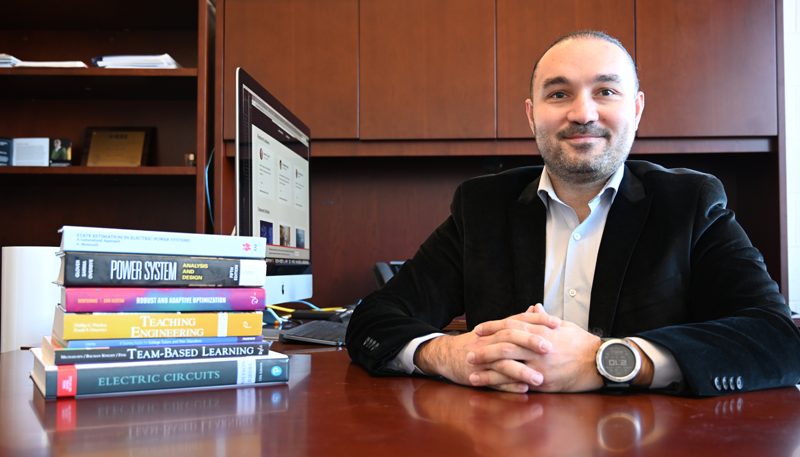January 08, 2024

From electric vehicles to electric heat pumps, Americans are plugging in more than ever. While that’s reducing emissions, it’s also creating increased demand on power grids — which are already more susceptible to blackouts as extreme weather becomes the norm.
That’s where Mert Korkali comes in. Korkali is an assistant professor in electrical engineering and computer science, and he studies sophisticated approaches to upgrading and securing power grids.
“We have power grid infrastructure that’s more than 100 years old in this country, and you can’t just continue to add more lines,” he said. “You have to retrofit old systems, which can take years. Our goal is to create credible and real-time solutions, especially as we rely more on renewable energy, which is weather-dependent.”
Challenges around power grids are multi-faceted. Electricity is powering more homes, cars, commercial trucks, and complex computing systems. Rising summer temperatures are causing significant peaks. Utility companies have to ensure that infrastructure not only meets the need but also that spikes don’t cause blackouts. Complicating the situation is that historic weather events such as hurricanes, tornadoes, wildfires, and solar storms — all of which can disrupt generation — are happening more frequently.
“Between weather, electric vehicles, and more computational demand, we have to take a holistic view of power grids,” Korkali said. “We have to measure the health of the whole system as well as different parts of the system. We’re looking for vulnerabilities and weak points in the system with a goal of preventing blackouts and reducing risks.”
Korkali and his team use large-scale modeling and simulation to study the electrical grid and connected infrastructure. They are developing strategies that incorporate solutions such as microgrids, small-scale grids that use renewable energy, and clean-energy generation units.
They are also investigating ways to develop and leverage artificial intelligence and statistical methods to handle increased demand and forecast the impact of changing weather, which will, in turn, facilitate computationally efficient and accurate assessment of uncertainties and risks for more reliable operation and planning of electric power grids.
“We’re looking at fundamental concepts that govern power grids, but also looking to new technologies to handle extreme events, especially as they become more frequent,” he said. “We can’t predict extreme events with a high accuracy, but there are models to approximate the chances and frequency of occurrence.”
Korkali came to Mizzou in 2022 after working for seven and a half years at the Lawrence Livermore National Laboratory in the San Francisco Bay Area. He earned his Ph.D. from Northeastern University and served as a postdoctoral research associate at the University of Vermont.
“I decided to return to academia because I like the opportunities to educate, mentor, and nurture the next generation of power and energy innovators and to collaborate with other researchers, national labs, industry, and utility companies,” he said.
At Mizzou, Korkali hopes to continue to find ways to collaborate with artificial intelligence and data science experts, atmospheric and climate science faculty, and local utility companies. He’s also looking forward to seeing interdisciplinary collaboration in the new Energy Innovation Center.
“We have an opportunity to build and shape a program here that provides new insights into analyzing and future-proofing large-scale and complex power grids and develops open-source tools and resources we can share with others,” he said. “It’s really exciting to explore open problems in power grids. And it’s more important than ever as we convert new energy resources and as traditional resources become scarce.”
Undergraduates and graduate students interested in joining his research team, can contact Korkali at korkalim@missouri.edu.
Energy Innovation Center
Through the Energy Innovation Center, the University of Missouri is committed to tackling challenges presented through rising energy concerns and rapid growth in artificial intelligence and how the two work together to optimize energy production, transmission and grid security. The $160 million, 180,000-square-foot facility, which is expected to open by 2027, will bring together engineers, agronomists, physicists, chemists and public policy experts to provide sustainable solutions for the future and strengthen domestic energy supply. Levels of the new center will be dedicated to nuclear energy and nuclear-engineered materials; hydrogen and renewables; energy storage; and grid security, resilience and innovation alongside public policy. EIC joins a growing tradition at Mizzou — similar to the NextGen Precision Health initiative — of bringing experts in different disciplines together for collaborative innovation. The College of Engineering, the College of Agriculture, Food and Natural Resources, and the College of Arts and Science stand together at the convergence of their faculty and research expertise with the Energy Innovation Center.